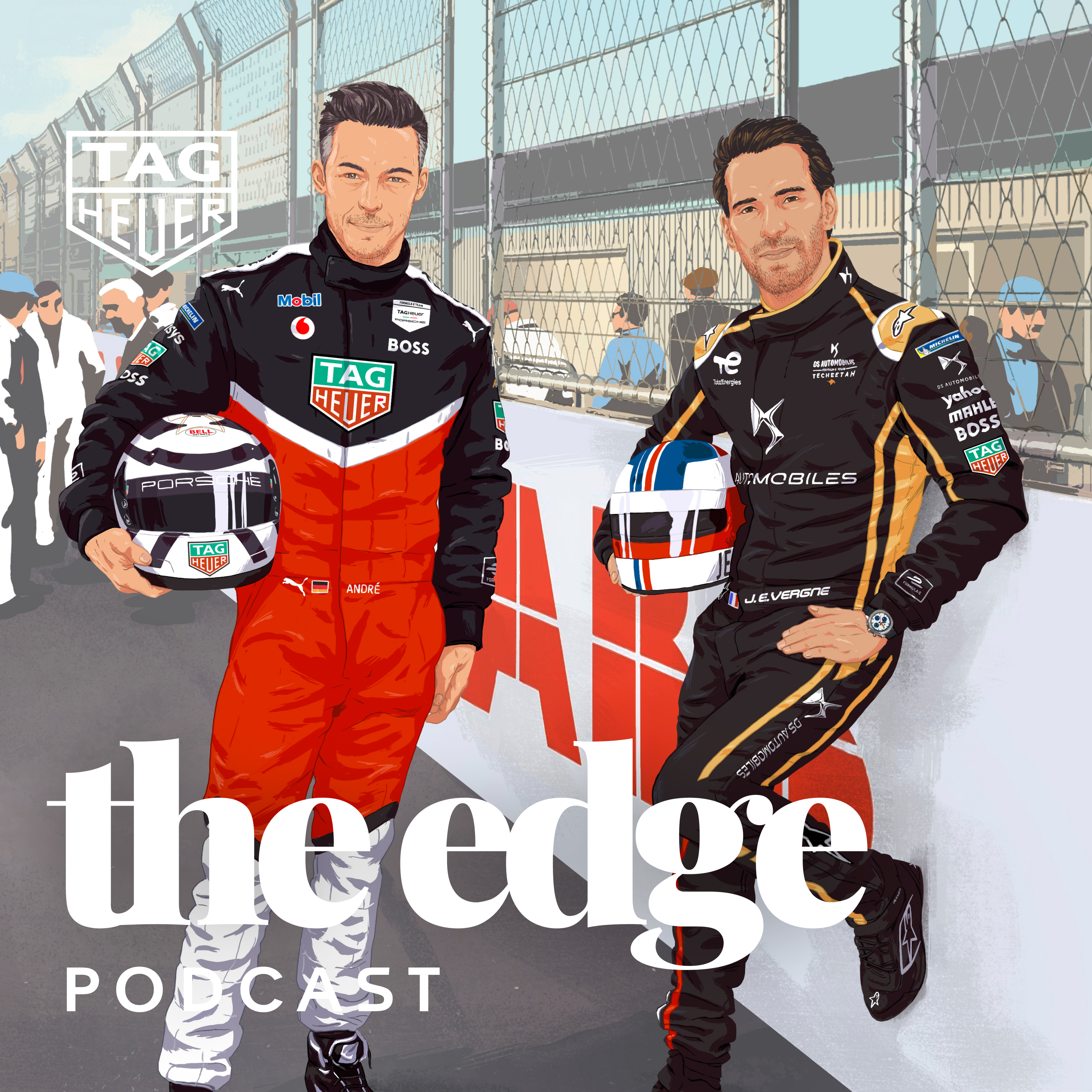Episode Transcript
[00:00:00] Speaker A: You.
[00:00:03] Speaker B: Our guest today is Summer McKintosh, a four time world aquatics champion, a two time Commonwealth Games gold medalist, and the current world record holder in the women's 400 meters individual medley. The best part? She's only 17 years old.
Dubbed a teen swimming sensation, summer burst onto the scene as the youngest member of the Canadian team for the 2020 Summer Olympics.
Since then, she has bagged a ton of medals and smashed several records. Summer tells us how she's preparing for the 2024 Olympics, what it feels like to be a record breaker, and where she gets her confidence from.
I'm your host, Teo Van Nbruka. Welcome to The Edge, a podcast by Tag Hoyer.
[00:00:56] Speaker A: To win that fourth gold medal, I mean, I think it was a really surreal moment. It feels like I just won my first one back in 2022. And just to kind of have that moment again and have my family in the stands and know that all my friends and family have been cheering me on since I started the sport of swimming, it was a really nice moment to share. And if I told my seven year old self this is where I'd be today, I'd just be so happy with what I've been able to achieve this far.
I think going into each race, no matter if it's my best race or my worst race, I definitely have confidence, and I think that all kind of stems from my training.
But before my race, I don't try to think too much about the time I want to go or record or placement that I want. I mean, obviously everyone diving into the pool wants to win, but it matters who wants it the most and who's worked for it the most. So that's what I try to kind of keep telling myself, is as long as I keep training as hard as possible and prove as much as possible, that's all I can really control, and you can't control what others do. So just trying to focus on myself heading into those big races is what kind of keeps me in the moment and keeps me being able to perform at my highest.
Even though I started off at such a young age, I think at quite a high level, like making the Olympic team at 14, I think I'm just so grateful that I was able to experience those things at Such. A young age because it taught me so many young, so many life lessons that I never would have had if I weren't to be in the situation I am today. And even though I've already achieved things like four gold medals at a World Championships, I'm always shooting for more and always trying to improve as much as possible as a person in and out of the pool in the moment. Each time I've touched the wall and got either on the podium or got a gold medal at the World Aquatics Championships, I think it's always just kind of a disbelief moment for me, but at the same time, it feels so real, and I just get super overjoyed and happy. I mean, I'm not an over expressor person. I mean, some stars will celebrate and sit on the lane rope, but that's just not me. That's not a personal thing to me. Obviously, I respect that, but that's how I feel on the inside. I just don't usually show that on the outside.
But yeah, I mean, it's always just such a cool moment to be able to represent my country at such a high stage in the world and to do it in front of a bunch of fans was also really cool.
When I was younger, I tried out so many sports because I really just liked all kind of sports and the concept around each of them. But I think I was so drawn to swimming just because it was a very simple sport, and it all kind of came back to just a simple whoever has the fastest time wins. But usually when I was very young, I had probably, like, five sports I was doing, but then when I hit around ten years old, I was either doing figure skating or swimming, and that's when I kind of decided, like, I didn't want to be in a sport where it was left up to someone else to decide.
It was a judged sport, obviously, for figure skating. So that's kind of how I decided to do swimming. And I don't know, but just always have a soft spot for it. My mom was an Olympian swimmer as well. She went to the 1984 Los Angeles Olympic Games, and my sister is still a figure skater for Canada.
And just kind of growing up in that atmosphere since a young age, it's always kind of taught me so many life lessons, not just about sports, but how to be a good person as well and finding that balance of really enjoying your sport, but realizing there's also more to life. We do really bond over both of us being in different sports. I think if we were in the same sport, it would be very different. But I think she really likes the art aspect of it as well, and being able to express herself through her jumping and her dancing. So I think she likes how, when she's competing, she has to do it very well and execute it perfectly, but at the same time look good while doing it. And that's another thing that I would not be able to do, especially if I had blades on my feet. So there's harder things in each of the sports. So I think it's cool kind of to bounce off one another with ideas.
Sure. Ever since a young age, I've always really loved just being in the water because I feel like I've heard this from a lot of other swimmers. It's just kind of their kind of meditation time, you feel very as. You can't really hear anything when your head's submerged, and you have lots of time to think, especially during practice.
And it just kind of is a very calming experience. Even when I'm not training, if I'm swimming or in a lake or an ocean, like in Florida, I mean, it's always a good time. And I don't know, I've always loved water ever since a young age, no matter what level I'm doing it at, whether if it's for training or just for leisure.
I think for me, I've known since a very young age that pressure is just a part of sport. And it's not just in sports, it's in many other aspects in someone's life. And rather than looking at it as pressure, I try to look at it as support from either my friends, my family, or my acquaintances, or people that follow me on Instagram, just things like that. I think it's all just support, though they might be thinking what I'd be able to do. I think that's quite inspiring to think that people are following along with me on my journey.
I'd say my mindset for when I'm training, competing stays relatively the same. I mean, obviously when I'm competing, it's even more focused than ever, and you kind of really have to dial in on those last few days heading up to a competition along with while you're in it, but on a daily basis, you're still always thinking about those big meets coming up. Like for Parish 2024, it's a daily reminder in my head, but it's a lot less intense, I'd say, on a daily basis, and it kind of builds up the closer you get to those big meets. So I think a lot of swimmers talk about that kind of mindset switch when you head to a big competition. For me, I really like it. I mean, I like both aspects of competitive swimming, whether it's training or competing. I think you kind of have to like both equally for different reasons to be successful. But for me personally, I really do enjoy those high intense moments of right before you get on the blocks before a race, you just get so much adrenaline and it kind of leads you through that first part of the race. And I don't know, I just try to have as much fun with it as possible. The 200 fly and the 400 Im are very different races, and preparing for that big lineup that I had at this last world championships was definitely something I thought about a lot during training, as you have to train for different things for each different event, and for the 200 fly, it's more of a sprint event. And since it is just the butterfly stroke, it's a lot more training, simply trying to keep endurance as high as possible rather than the 400 Im. Even though there is 100 fly at the beginning, you still got a 300 to go of each of the strokes. So being able to be super versatile and being able to switch in between each strokes as fast as possible is something that takes a lot of time and effort and something that you really have to think about when you're training.
The team aspect in competitive swimming is so important. I think that's what Team Canada is such a good job at is being able to kind of bond all of us together when we make a World Championship team or an Olympic team, where we all are really close knit because we really understand each other, what others are going through in those moments.
So that's another thing I really like about swimming is even though it is such an individual sport, there are aspects to it that are much like team sports, whether it's we all train together every single day on a daily basis, or there's also relay races, which is four people together to get one medal. So I don't know, I think that's really cool to kind of have those bits and pieces of team and individual sport. Four x one medley relay, it was about, I would say 15 to 20 minutes after the 400 individual medley. So it was definitely something that is really hard mentally to do, to have those back to back races. But relays are just so fun and you get that extra little bit of adrenaline since you are in that team environment. And I have three other girls around me that I'm really close to and that I know have my back. And we are all just trying to help each other out and push ourselves as much as possible to be able to as we were able to get that bronze medal. So kind of feeding off that team energy is super important, especially if you just swam or you're tired because it's the last day of the meet. I think for relays in individual races, there's kind of aspects that I like for both. I mean, obviously I have complete control if I'm just on my own in individual race, but I like having the relays as well because it's more fun in a way to kind of be able to feed off that energy, like I said.
But yeah, be able to do both is really, really fun. And having that team and individual aspect within the same sport is something that I don't think is really a part of any other sport.
I think there's so many challenges throughout anyone's career. I mean, I can't really pinpoint an exact one, but there's always many things that you have to really learn to be adaptable to, whether it's coaching changes or even when it comes to traveling across the world and completely. Your time zone completely flipping three days out of a big race, learning to be able to cope and deal with those things and look at the positive sides of them is something that I've had to learn very quickly. And I'm glad that I've been surrounded by others to kind of learn that together with amazing.
[00:11:00] Speaker C: How are you preparing for the 2024 Olympics? Is there anything you're going to change in your training process?
[00:11:05] Speaker A: Yeah, so for 2024 Olympic Games in Paris, as of right now, I'm just kind of getting back into this season. It's probably like I've been in the water for a month now, and I'm just kind of trying to get better each day in each practice and really trying to focus in on all the smaller things that can shave off, even just milliseconds off my time, whether that's technique changes in each stroke or turns and things like that. So it's all those small little details that you wouldn't think would change that much. But in the end game, if you have seven turns and a 400 race, that can take off lots of time.
[00:11:41] Speaker C: You also won two gold medals at the World Championships in 2022. Is there anything in your approach or training that's changed since then?
[00:11:49] Speaker A: Yes, for sure. Heading into the World Aquatic Championships in 2022, where I won those two golds, that my training was very different, and I think since then I've learned so much from what I need in my training, especially since it is such a long meet and the Olympics will be nine days long. So being able to be as fresh on day nine as you are in day one is something that takes a lot of time and effort and a lot of thought to kind of being able to recover as much as possible. And that all kind of comes back to what I'm doing now, which is just training, training. So that's something that each year after a big meet, I kind of debrief with my coach and try to go over what I need in my training to keep being able to be strong throughout a very long meet like that.
[00:12:40] Speaker C: Finally, Summer, you've broken both national and international records, which is an extraordinary feat for a teenager. How does it feel and is it something you want to keep achieving?
[00:12:50] Speaker A: Yes, for sure, no matter what record it is. I mean, when I broke my first world record, it was super unexpected and very surreal.
I'd always be happy to break any sort of record. I mean, I think it's really cool because it's a part of history, especially at the level of a world record.
But at the same time, even though I had the 400 individual medley world record if someone were to break it, I think it would be so cool to see being how the sport keeps evolving and achieving greater feats and things like that. And that would just aspire me to be even better and seeing not just on the woman's side, but also on the men's side. Everyone's starting to break more and more world records. I feel like every year it's just really cool to see the sport of swimming having such great momentum each year and kind of how it evolves over time.
[00:13:42] Speaker C: I was also intrigued to know, is it difficult to build friendships within your sport because there's a natural competition between people, or do you kind of support each other and help each other along? What's that dynamic like when it comes.
[00:13:58] Speaker A: To building friendships within the sport? I think I would speak for most when I say it's honestly so easy because when you get getting up at 04:00 a.m. To go to practice and you're all pushing your hardest, pushing your bodies to the limit every single day in and day out, it really bonds everyone together. And I think not just me, but a lot of my teammates have built lifelong friendships with one another and it's really cool to see and be a part of just because we are such a tight knit team and we kind of just all have it. We're all just together and we're in for the ride together. And I don't know, I think some of my closest friends are all either in the sport of swimming and that I've trained with in the past or am still training with or some other athlete.
[00:14:49] Speaker C: Amazing. Summer McIntosh, thank you so much for joining me at The Edge. It's been wonderful to have you.
[00:14:54] Speaker A: Thank you for having me.
[00:15:06] Speaker B: Thank you for listening to this episode of The Edge. If you'd like to listen to more episodes like this one, have a listen to our interviews with athletes Fred Curley, Sidney McLaughlin and Sky Brown.
If you enjoyed this episode, don't forget to subscribe and leave us five stars. It does make a difference us.
Thank you to Summer McIntosh for joining us. I'm your host Teya Van Denbrooker, and I'll be back next month with another episode of The Edge, a podcast by Tag Hoyer.
[00:15:39] Speaker C: See you soon.






